الأسواق
عند تصميم تدخل إنساني وتحديد ما إذا كان سيتم استخدام المساعدات النقدية والقسائم، يجب أن يكون تحليل السوق جزءًا من تحليل الاستجابة الشامل. وثبت أن دعم الأسواق للعمل بشكل جيد يؤدي إلى تعافي أسرع وزيادة المرونة في المناطق المتضررة من الكوارث.
واستثمرت العديد من المنظمات في تطوير أدوات لدعم تحليل السوق وتفكر في البرمجة القائمة على السوق بشكل أكثر شمولية. يشمل ذلك التدخلات التي تستخدم السوق (مثل التحويلات النقدية إلى السكان المتضررين)، بالإضافة إلى التدخلات التي تدعم الأسواق بشكل مباشر (مثل المنح المشروطة للمتداولين لإعادة تشغيل أسواقهم).
Related initiatives
Featured content

Introduction to Market Analysis
دورة تدريبية
This 30 minute online course provides an introduction to the analysis of markets in emergency contexts, with input from some of the world’s leading thinkers on the topic.

A Practical Guide to Market Analysis in Humanitarian response
دورة تدريبية
A three to four hour online course designed to provide future humanitarian market assessment team members with a solid understanding of theory and steps of market assessments so that they can join assessment teams prepared with a basic understanding of what they will be doing and why.
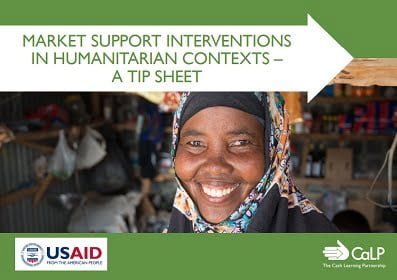
Market Support Interventions in Humanitarian Contexts – a Tip Sheet
Guidelines and Tools
This tip sheet defines what market support programming in humanitarian contexts is, and what it can look like in practice. It enables humanitarian practitioners to systematically consider market support interventions alongside other programme activities. The scope includes support interventions focusing on supply/availability and on demand/access. The tip sheet is based on secondary data...
Latest
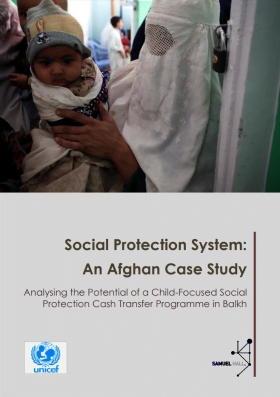
Social Protection System: An Afghan case study, analysing the potential of a child-focused social protection Cash Transfer Programme in Balkh
Report
UNICEF is considering the development of a social protection programme with a specific focus on children, within the already existing framework developed by the World Bank and MoLSAMD. With the end goal of articulating children-sensitive programming with the World Bank’s own safety net programme in...

Guidelines for Conditional Cash-for Rent Assistance for Syrian Refugees in Jordan
Guidelines and Tools
The objective of these guidelines is to inform Shelter sector partners of best practices for implementing conditional cash-for-rent assistance targeting Syrian refugees in the host communities. These guidelines have been developed by a taskforce of the Shelter Working Group.
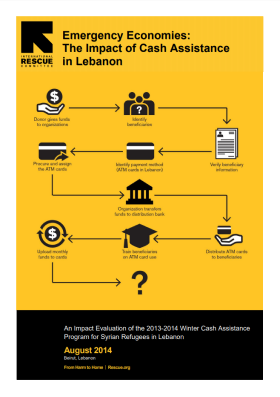
Emergency Economies: The impact of cash assistance in Lebanon
Report
An impact evaluation of the 2013-2014 winter cash assistance program for Syrian refugees in Lebanon. This report describes the impacts of the winter cash transfer program run by UNHCR and partners from November 2013 to April 2014. The program gave $575 USD via ATM cards to 87,700 registered Syrian...

Communications Technology and Humanitarian Delivery – Challenges and Opportunities for Security Risk Management
Report
The articles contained in this publication are dispatches from a new frontline in humanitarian action: the digital frontier. All are written by those observing, experiencing and attempting to respond to the challenges created by the digital revolution and the very real threats it is creating for...

Cash Transfers and Resilience: Strengthening Linkages Between Emergency Cash Transfers and National Social Transfer Programmes in the Sahel – Discussion Paper
Report
This discussion paper has been inspired by the exchanges that took place during the course of the learning event. It seeks to extend the discussion to include other actors working within the region, as well as in other regions confronted with the same questions. It proposes an initial approach to the...
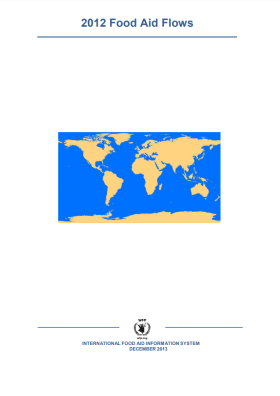
Food Aid Flows 2012 Report
Report
In 2012 global food aid deliveries totaled slightly more than 5 million mt. The World Food Programme (WFP) remains the primary means for delivering food assistance: 58 percent of global food aid was provided through WFP in 2012. Countries in Sub-Saharan Africa were the main recipients of food aid in 2012,...
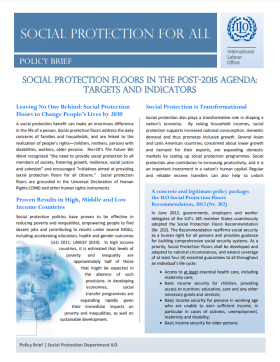
Social Protection Floors in the Post-2015 Agenda: Targets and indicator
Policy paper
A policy brief outlining the post-2015 targets and indicators for social protection. To be transformational and make a real difference in people’s lives by 2030, two issues are critical: (1) universal coverage, for all, and (2) adequate benefits, ensuring that at least all in need receive sufficient...
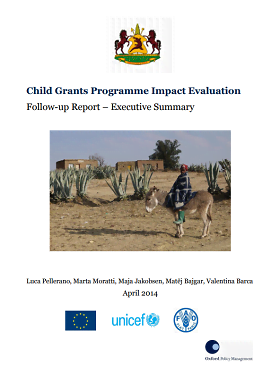
Child Grants Programme Impact Evaluation Follow-up Report – Executive Summary
Case Study
The Lesotho Child Grants Programme (CGP) is an unconditional social cash transfer targeted to poor and vulnerable households. It provides every quarter a regular transfer of between M360 and M7501 to poor households with children that are selected through a combination of Proxy Means Testing (PMT) and...

The CALP Network Level 2 Training – Module 3 – Selecting, designing and implementing CTPs
Guidelines and Tools
The objective of the Level 2 training is to strengthen the capacity of humanitarian actors in cash transfer programme design and implementation, to share recent research and learning, and encourage advocacy, institutionalisation and coordination in cash transfer programming (CTP). This training follows...

Case Study: Unconditional cash transfers response to Typhoon Haiyan (Yolanda)
Report
Typhoon Haiyan, the most powerful storm ever recorded, first made landfall in the morning of 8 November 2013 in Guiuan, Eastern Samar province, causing extensive damage to life, housing, livelihoods and infrastructure across nine of the Philippines’ provinces. The islands of Leyte and Samar were among...
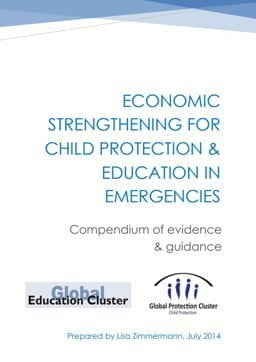
Economic Strengthening for Child Protection & Education in Emergencies
Guidelines and Tools
The aim of this compendium is to provide education and child protection coordinators and partners working in the field who are involved in or confronted with economic strengthening programmes with key existing evidence and guidance documents in order to inform their work, at all stages of a programme...
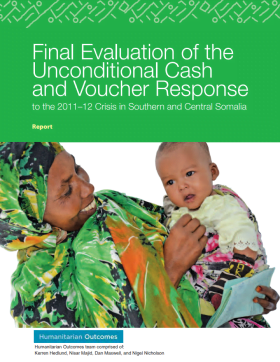
Final Evaluation of the Unconditional Cash and Voucher Response to the 2011–12 Crisis in Southern and Central Somalia
Report
This report sets out to determine the effectiveness of the unconditional cash and voucher interventions in southern and central Somalia. This evaluation however cannot be limited to the interventions at hand. It necessarily considers the broader context that led to the failure of the humanitarian...
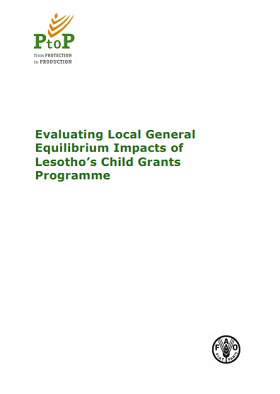
Evaluating Local General Equilibrium Impacts of Lesotho’s Child Grants Programme
Report
This report presents findings from a local economy-wide impact evaluation (LEWIE) of Lesotho’s Child Grants Programme. Simulations indicate that total income impacts significantly exceed the amounts transferred under the programme: each loti transferred stimulates local nominal income gains of up to...

Surveying Livelihoods Service Delivery and Governance: Baseline evidence from Nepal
Report
In 2012/13, SLRC implemented the first round of an original cross-country panel survey in Nepal designed to produce information on: people’s livelihoods (income-generating activities, asset portfolios, food security, constraining and enabling factors within the broader institutional and geographical...
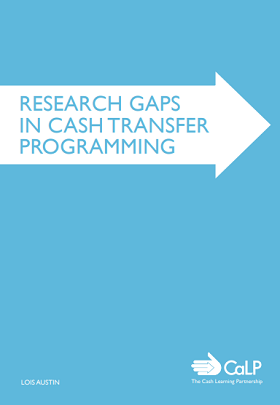
Research gaps in cash transfer programming
Report
Gathering evidence through action research is one of the ways that the CALP Network aims to improve cash transfer programming (CTP) implementation and raise awareness about CTP and its use as an appropriate and effective mechanism for emergency response. Before defining potential research topics for 2014,...

Understanding the Interaction Between Women’s Economic Empowerment and Gender Based Violence: Study on ACF’s cash transfer programme in northern Uganda
Report
This paper presents findings of a qualitative study conducted in Northern Uganda, on the effects of a cash transfer programme on gender relations and GBV in a post – conflict context. The intervention in focus is Action Against Hunger |ACF International (ACF)’s ‘Combating Gender Based Violence and...
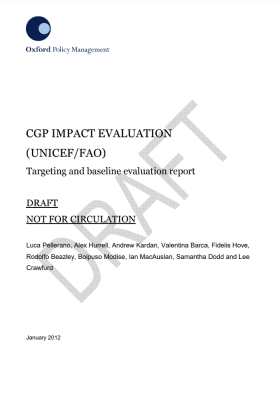
CGP Impact Evaluation (UNICEF/FAO): Targeting and baseline evaluation report
Report
The Child Grants Programme (CGP) is an unconditional cash transfer targeted to poor and vulnerable households in Lesotho. The primary objective of the CGP is to improve the living standards of Orphans and Vulnerable Children (OVC) so as to reduce malnutrition, improve health status, and increase school...
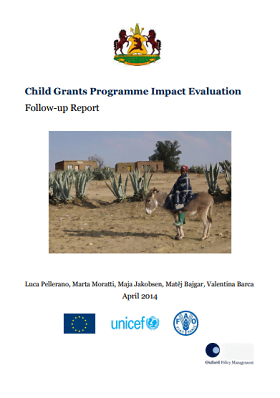
Child Grants Programme Impact Evaluation Follow-up Report
Report
The Lesotho Child Grants Programme (CGP) is an unconditional social cash transfer targeted to poor and vulnerable households. It provides every quarter a regular transfer of between M360 and M7501 to poor households with children that are selected through a combination of Proxy Means Testing (PMT) and...
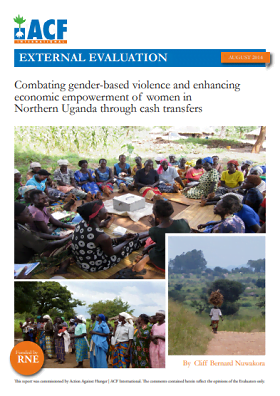
Combating gender-based violence and enhancing economic empowerment of women in Northern Uganda through cash transfers
Report
The aim of this evaluation is to assess the relevance, sustainability, effectiveness and efficiency of the programme. Moreover, the evaluation will assess the impact of the programme on women and girls in relation to livelihoods and economic empowerment and access to social services, including education,...

Evidence of impact of emergency cash transfers on gender and protection
Report
This rapid review gathers together reports which provide evidence on the gendered and protection impacts of cash transfers (CTs) in emergency and humanitarian contexts. It aims to provide a guide to the level and type of evidence which is available, as much of the work written on this topic relies on...